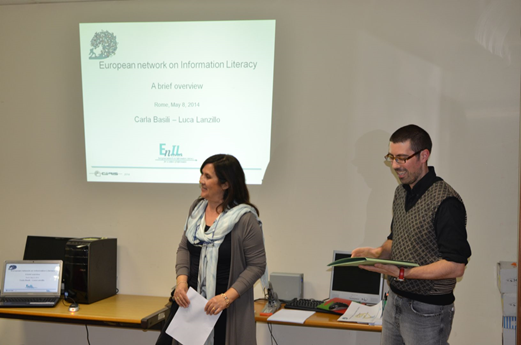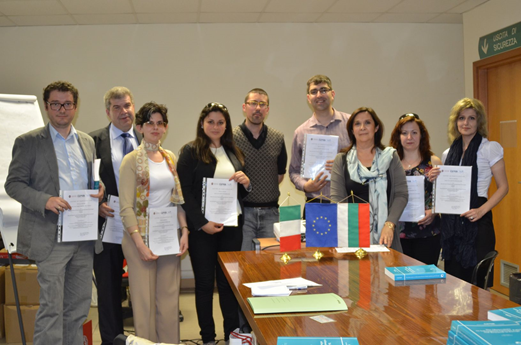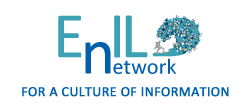Search
EnIL network - News and activities 2014
October 10, 2014 (EnIL participation)
UNESCO’s Overview of Information Literacy Resources Worldwide 2nd ed. 2014-2015
Edited by Dr. F. Woody Horton, the second edition of the UNESCO sponsored publication, Overview of Information Literacy Resources Worldwide 2014-2015, is available for download.
The multilingual multinational database therein contains Information literacy bibliographies for 130 countries and 101 languages.
June 19, 2014 (EnIL activity)
EnIL workshop on “Information Literacy in the Context of Scientific Information Policies”
The workshop has been hosted by the 18th International Conference on Electronic Publishing “Let's put data to use: digital scholarship for the next generation” held on June 19-20, 2014 at the Alexander Technological Education Institute of Thessaloniki - Thessaloniki, Greece.
Convenors:
Carla Basili, EnIL co-ordinator
Aspasia Togia, ATEITh
Claudia Yogeswaran, University College London
Panelists
Information literacy policies in Europe and the European Observatory on IL Policies and Research (Aspasia Togia)
Scientific Information Management Policies and Information Literacy Schemes in Greek Higher Education Institutions and Libraries (I. Clapsopoulos, S. Zapounidou, M. Balatzaras and D. Petrinos)
Information literacy aspects in the Open Science environment (P. Georgiou)
Information literacy skills and aspects: some quality assurance aspects (Milena Dobreva)
The aim of the workshop is to discuss Information Literacy in the context of Scientific Information Polices, according to the following rationale.
WORKSHOP RATIONALE – PILLARS OF THE DEBATE
1. AN EFFICIENT FRAMEWORK FOR ANALYSING INFORMATION POLICIES IS THE “3CS MODEL”. According to this model, the main axes along which an efficient information policy articulates are:
- CONNECTIVITY: measures aimed at creating a well-established structure – both institutional (for example, the libraries in a country) and technological (for example, the Internet) – acting as a “conveyer” (or distribution network) of information to every citizen;
- CONTENT: measures aimed at assuring that reliable information is conveyed to “connected” users;
- COMPETENCIES: measures aimed at assuring that “receivers” are able to efficiently retrieve and fully exploit the conveyed information, i.e. , the Information Literacy goal.
2. INFORMATION LITERACY IS LINKED TO INFORMATION POLICY IN THE EUROPEAN COMMISSION VISION. Information Literacy explicitly entered the EU policy making landscape (ONLY) with the IMPACT Programme (1988-1995) – a community programme devoted to Information Policy – and more specifically through the action line “Increasing user-friendliness and improving information literacy”.
3. INFORMATION LITERACY IS NATIVELY A POLICY ISSUE, but not yet entered in the policy debate. Information Literacy was natively conceived as a policy goal, involving the decisional level of society. The corpus of literature on Information Literacy is permeated by the initial coin of the term “Information Literacy” attributed to Paul Zurkowsky, who in 1974 wrote to the US National Commission on Libraries and Information Science that: “ … the top priority of the National Commission on Libraries and Information Science should be directed toward establishing a major national program to achieve universal information literacy by 1984.”
4. SCIENTIFIC INFORMATION IS INCREASINGLY A PILLAR IN THE POLICIES FOR THE EUROPEAN RESEARCH AREA (see EC official documents like "Study on the economic and technical evolution of the scientific publication markets in Europe" 2006) followed by a public consultation (from 31 March to 15 June 2006) addressed to individual researchers, academic organisations, libraries, information organisations and publishers. Results from the 2006 consultation have provided the basis for the next Communication on scientific information in the digital age: access, dissemination and preservation (2007).
5. POLICY MEASURES FOR SCIENTIFIC INFORMATION HAVE BEEN AND WILL CONTINUE TO BE SUBJECT TO PERIODIC REVIEW AND REVISION, as a function of factors both internal and external to the science system.
The concept itself of "scientific information policies" tends to adapt to new configurations of the scientific system, to emerging models of knowledge circulation, the alternation of new agents, as well as to the role and functions of innovative vehicles for the dissemination of scientific results. (RESEARCH DATA, RESEARCH INFRASTRUCTURES, KNOWLEDGE TRANSFER BESIDES KNOWLEDGE SHARING, OPEN ACCESS)
6. FROM AN ECONOMIC PERSPECTIVE, knowledge sharing and transfer are increasingly the leitmotiv of the recommendations issued by the European Commission to support the economic development of Europe.
In view of the above, the workshop intends to analyse Information Literacy as an element of Scientific Information Policy, aiming to understand the mutual influence between Information Literacy policies and Scientific Information policies.
More specifically, the workshop is aimed on the one hand to understand how new patterns of circulation for scientific information can induce changes in the traditional models of Information Literacy, and on the other how Information Literacy policy objectives constitute an integral part of Information Policy strategies.
May 8, 2014 (EnIL activity)
Study visit at the Italian National Research Council (Ceris – EnIL location) by a delegation from the State University of Library Studies and Information Technologies (SULSIT) of Sofia (Bulgaria)
On behalf of Assoc. Prof. Dr. Tania Todorova from the State University of Library Studies and Information Technologies (SULSIT) of Sofia, a study visit to learn more about The European network on Information Literacy (EnIL) and the Sapienza University in Rome has been arranged by Dr. Tereza Trencheva.
The Bulgarian researchers involved in the event are:
Dr. Tereza Trencheva – Department “Library Management”
Dr. Diana Stoyanova – Department “Cultural Historical Heritage”
Dr. Dobri Boyadgiev – Department “Information Technologies”
Dr. Vasil Zagorov – Department “Book and Society”
Dr. Elena Ignatova – Department “Information Security”
Enclosed some pictures of the event.


March 14, 2014 (EnIL activity)
Abstract submission to ECIL 2014
Raising Policy Awareness About Scientific Information Literacy in the European Research Area: A First Set of Options
Carla Basili
Ceris Institute, National Research Council, Rome, Italy. c.basili@ceris.cnr.it
Stéphane Goldstein
Research Information Network, London, UK. stephane.goldstein@researchinfonet.org
In the current political and cultural climate, the role of Scientific Research is conceived in the context of the Knowledge Economy paradigm, where improving knowledge circulation and use constitute obviously crucial goals.
One major imperative underpinning this rationale is “Improving access to scientific information”, a challenge so far addressed within the scope of the Open Access (OA) movement, focused on new publishing models relating to scholarly journal literature, and to a still limited extent, monographs. But significantly improving access to scientific information requires a broader perspective than that which has so far been provided by the OA approach.
The paper will therefore consider the goal of improved access in a wider context:
(i) from the point of view of all users of scientific results, not just researchers;
(ii) for every form of scientific output: for instance, research data, patents, research infrastructures, prototypes, in addition to the traditional scholarly literature.
Such a wider view is rooted in the European Commission’s policy view on OA, conceived as “The policy and practice of granting immediate and free internet access to scientific results (including peer-reviewed journal articles)” (EC, 2012a), as well as on the different aspects of access, as theorised in the specialized literature.
The ability and capacity of individuals to secure this sort of access, and to be aware of the means of gaining access, is an important component of “Scientific Information Literacy” (SIL), the focus of this paper.
Moving from the analysis of a selected set of policy documents released since 2007 by the European Commission on Scientific Information in the European Research Area, the paper will show that Scientific Information Literacy is a neglected issue. The paper will also demonstrate that the education and training of researchers and other stakeholders in the research and innovation sphere, to ensure that they have appropriate levels of SIL, is a need that should be mainstreamed in EC policies. This is important also to maximize the impact of public investments in research not only for science, but - even more - for innovation.
There is a real challenge in achieving such mainstreaming. The paper will propose how the attaining of OA objectives might serve as a vehicle for demonstrating the relevance and importance of SIL as a policy issue. It will also explore how networking organisations such as the European Network for Information Literacy (EnIL) and, in the UK, the Research Information and Digital Literacies Coalition (RIDLs), can help to influence the policy agenda by capitalizing on the outlooks of the different communities that they represent.
Keywords: Scientific information literacy, European policies, open access, research and innovation
February 24, 2014 (EnIL activity)
RIN (Research Information Network) – EnIL
First steps towards identifying common research interests between the InformAll initiative, managed by RIN (Research Information Network), and EnIL (the European network on Information Literacy).


